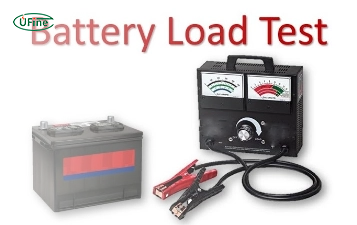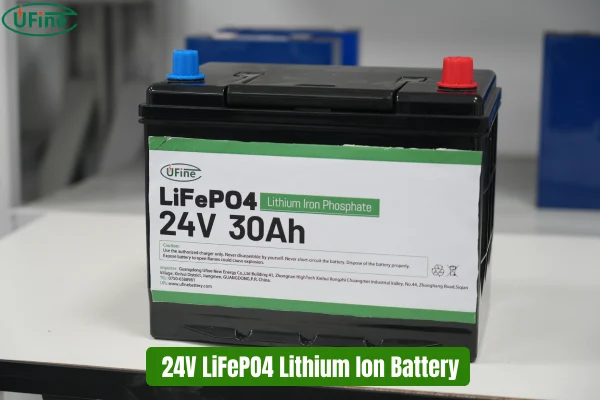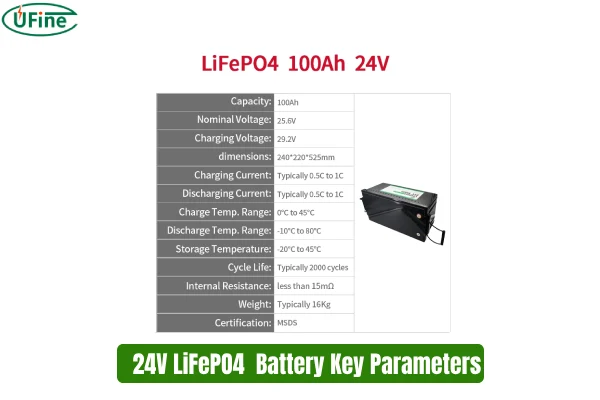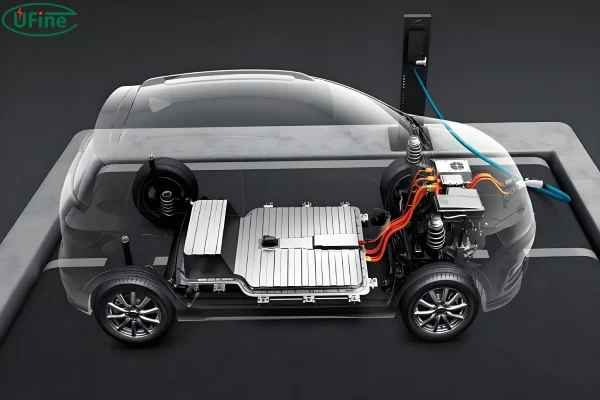
The world is shifting towards a more sustainable future, and at the heart of this change lies the power of batteries. Among these energy storage solutions, 24V lithium ion batteries are emerging as a leading force, powering everything from electric vehicles and solar energy systems to industrial equipment and off-grid living. But with so many options and technical details, choosing the right 24V lithium ion battery can feel overwhelming. This comprehensive guide will equip you with the knowledge to navigate this exciting world, helping you make informed decisions and unlock the full potential of these powerful energy sources.
Part 1. Understand 24V lithium ion battery
A 24V lithium ion battery is a sophisticated energy storage device that offers several advantages over traditional lead-acid batteries. The higher voltage provides greater power output, making it ideal for applications demanding more energy. This makes them a popular choice for:
- Electric Vehicles: From golf carts to electric cars, 24V batteries power the motors and provide the necessary range for sustainable transportation.
- Solar Energy Storage: 24V batteries store energy generated by solar panels, ensuring a reliable source of power even when the sun isn’t shining.
- Off-Grid Living: These batteries are essential for off-grid homes and businesses, providing a reliable source of electricity independent of the grid.
- Industrial Applications: 24V batteries power forklifts, electric tools, and other industrial equipment, contributing to a more efficient and environmentally friendly workplace.
Part 2. 24V lithium ion battery types
The world of 24V lithium ion batteries is diverse, with different chemistries offering unique advantages and drawbacks. Understanding these variations is crucial for choosing the right battery for your specific needs.
1. Lithium Iron Phosphate (LiFePO4): The Reliable Workhorse
LiFePO4 batteries have become a popular choice due to their exceptional safety, long lifespan, and reliable performance. They are known for their thermal stability, making them less prone to overheating and fires compared to other lithium-ion chemistries.
-
Key Features:
- High Safety: LiFePO4 batteries are inherently safer due to their stable chemical composition, making them a preferred choice in applications where safety is paramount.
- Long Cycle Life: They boast an impressive cycle life, typically exceeding 2,000 cycles, meaning they can be charged and discharged numerous times before experiencing significant capacity degradation.
- Excellent Thermal Stability: LiFePO4 batteries maintain their performance even at high temperatures, making them suitable for various environments.
- Environmentally Friendly: They are environmentally friendly, as they do not contain heavy metals like cobalt or nickel, reducing environmental impact.
-
Applications: LiFePO4 batteries are ideal for electric vehicles, solar energy storage systems, backup power solutions, and off-grid living setups.
2. Lithium Nickel Manganese Cobalt Oxide (NMC): Balancing Power and Stability
NMC batteries offer a well-rounded combination of high power output and good stability. They are often favored for applications requiring a balance between performance and longevity, such as electric bicycles, power tools, and some electric vehicle models.
-
Key Features:
- High Energy Density: NMC batteries pack a high amount of energy into a compact size, making them suitable for applications where space and weight are crucial.
- Good Power Output: They deliver a strong power output, enabling them to handle demanding tasks.
- Relatively Long Cycle Life: NMC batteries offer a respectable cycle life, although it may not be as long as LiFePO4.
-
Applications: NMC batteries are ideal for electric bicycles, power tools, and some electric vehicle models.
3. Lithium Cobalt Oxide (LCO): The Powerhouse for Electronics
LCO batteries are commonly found in consumer electronics like smartphones and laptops due to their high energy density and relatively low cost. They offer good performance for devices requiring a compact power source, but their lifespan and safety are not as impressive as LiFePO4 or NMC.
-
Key Features:
- High Energy Density: LCO batteries are known for their high energy density, enabling them to store a significant amount of energy in a small package.
- Relatively Low Cost: They are generally less expensive than LiFePO4 or NMC, making them an attractive option for budget-conscious applications.
-
Applications: LCO batteries are primarily used in consumer electronics like smartphones, laptops, and other portable devices.
Part 3. Key parameters to consider
To make an informed decision, it’s crucial to understand the key parameters that define the performance and capabilities of a 24V lithium ion battery.
1. Capacity: The Energy Reservoir
Capacity, measured in amp-hours (Ah), represents the amount of electrical energy a battery can store. A higher capacity translates to longer run times for your devices and the ability to power more demanding applications.
2. Voltage: The Driving Force
Voltage determines the electrical potential of the battery. A 24V battery has a higher voltage than a 12V battery, meaning it can deliver more power. This is crucial for applications requiring a higher voltage, like electric vehicles and larger solar systems.
3. Cycle Life: The Measure of Longevity
Cycle life refers to the number of times a battery can be fully charged and discharged before its capacity significantly drops. A higher cycle life indicates a longer lifespan, making the battery a more valuable investment.
4. Temperature Range: Operating Within Limits
Lithium Battery Temperature Range: Everything you Need to Know
Temperature range specifies the operating temperatures at which the battery performs optimally. Exceeding the temperature range can negatively impact battery performance and lifespan. It’s essential to choose a battery with a temperature range that aligns with your expected operating environment.
Part 4. Common Capacities
24V lithium ion batteries are available in a range of capacities, each suited for specific applications.
1. 100Ah: A Versatile Choice
100Ah 24V lithium ion batteries are a versatile option for various applications, including:
- Electric Vehicles: They can power smaller electric vehicles like golf carts, electric bicycles, and some light-duty electric cars.
- Solar Energy Storage: They provide sufficient capacity for storing energy generated by solar panels, powering homes or businesses with renewable energy.
- Backup Power Systems: They can serve as a reliable backup power source during power outages, ensuring the continuity of essential appliances and devices.
2. 200Ah: High Capacity for Demanding Applications
200Ah 24V lithium ion batteries offer high capacity, making them ideal for demanding applications like:
- Electric Vehicles: They can power larger electric vehicles, including some passenger cars and light trucks.
- Large Solar Systems: They provide ample capacity for storing energy generated by large-scale solar installations, powering entire homes or businesses.
- Off-Grid Living: They are suitable for off-grid living setups, providing reliable power for essential appliances and devices.
3. 300Ah: The Ultimate Powerhouse
300Ah 24V lithium ion batteries are the ultimate powerhouses, offering exceptional capacity for demanding applications. They are often used in:
- Heavy-Duty Electric Vehicles: They can power large electric vehicles like buses, trucks, and heavy machinery.
- Large-Scale Solar Systems: They provide immense capacity for storing energy generated by large solar farms, powering entire communities or industrial facilities.
- Off-Grid Power Solutions: They are ideal for off-grid living setups requiring substantial energy storage for extended periods.
Part 5. Choosing the right battery: a step-by-step guide
Choosing the right 24V lithium ion battery involves a careful consideration of your specific needs, budget, and priorities. Here’s a step-by-step guide to help you make an informed decision:
1. Define Your Application Needs: What Will It Power?
- Identify your primary application: Will it be used for electric vehicles, solar energy storage, or providing backup power?
- Determine your power requirements: What devices will it need to power, and for how long?
- Consider environmental factors: Will the battery be exposed to extreme temperatures or harsh conditions?
2. Set Your Budget: Balancing Cost and Value
- Establish a realistic budget: Consider the price range of different battery types and brands.
- Factor in long-term costs: A higher-quality battery with a longer cycle life may be a better investment in the long run.
3. Research Brand Reputation: Trust Matters
- Explore reputable manufacturers: Look for brands known for quality, reliability, and customer support.
- Read reviews and testimonials: Gain insights into the real-world performance and durability of different batteries.
4. Consider Key Parameters: Matching Specs to Needs
- Capacity: Choose a battery with sufficient capacity to meet your power requirements.
- Voltage: Ensure the battery’s voltage matches your device’s specifications.
- Cycle Life: Opt for a battery with a high cycle life for longer lifespan and better value.
- Temperature Range: Select a battery that can operate within your expected temperature range.
5. Don’t Forget the Charger: A Vital Companion
- Compatibility: Ensure the charger is compatible with your battery’s specifications.
- Features: Look for features like overcharge protection, smart charging, and rapid charging capabilities.
Part 6: Charging and maintenance: extending battery life
Proper charging and maintenance are crucial for extending the lifespan of your 24V lithium ion battery.
1. Regular Charging: Avoid Deep Discharges
- Regularly charge the battery: Avoid letting the battery discharge completely, as this can shorten its lifespan.
- Follow the manufacturer’s charging recommendations: Use the recommended charger and charging methods.
2. Storage: Keep it Cool and Dry
- Store in a cool, dry place: High temperatures and humidity can degrade the battery.
- Avoid direct sunlight: Sunlight can also negatively impact battery performance.
3. Inspection: Catch Problems Early
- Regularly inspect the battery: Check for any signs of damage, leaks, or corrosion.
- Address any issues promptly: Contact the manufacturer or a qualified technician if you notice any problems.
Part 7. Conclusion
The world of 24V lithium ion batteries is dynamic and evolving, offering a wide range of options to power a more sustainable future. By understanding the different types, key parameters, and considerations outlined in this guide, you can confidently make an informed decision that meets your specific needs.
Related Tags:
More Articles

Battery Load Test: A Comprehensive Guide
Step-by-step battery load test guide for car, solar & industrial use. Learn how to load test a battery, interpret voltage charts, and avoid common mistakes.
The Comprehensive Guide to Battery Balancing and Battery Balancer
Discover how battery balancers improve lithium battery performance, lifespan, and safety. Learn types, functions, and tips to choose the right balancer.
What Is the Best Voltage for a Chainsaw Battery?
Compare 12V-80V chainsaw batteries for light pruning, medium firewood, and professional cutting. See best battery chainsaw with runtime charts and safety tips.
Lithium VS. Alkaline Batteries: A Comprehensive Comparison
Lithium batteries last 3–7× longer than alkaline and perform better in cold weather. Compare lifespan, cost, safety, and best uses to choose the right battery.
Comparing Lithium-Sulfur and Lithium-Ion Batteries: Which is Right for You?
Compare lithium-sulfur (Li-S) and lithium-ion batteries on energy, lifespan, cost, safety, and applications. Best choice for drones, EVs, and electronics.





